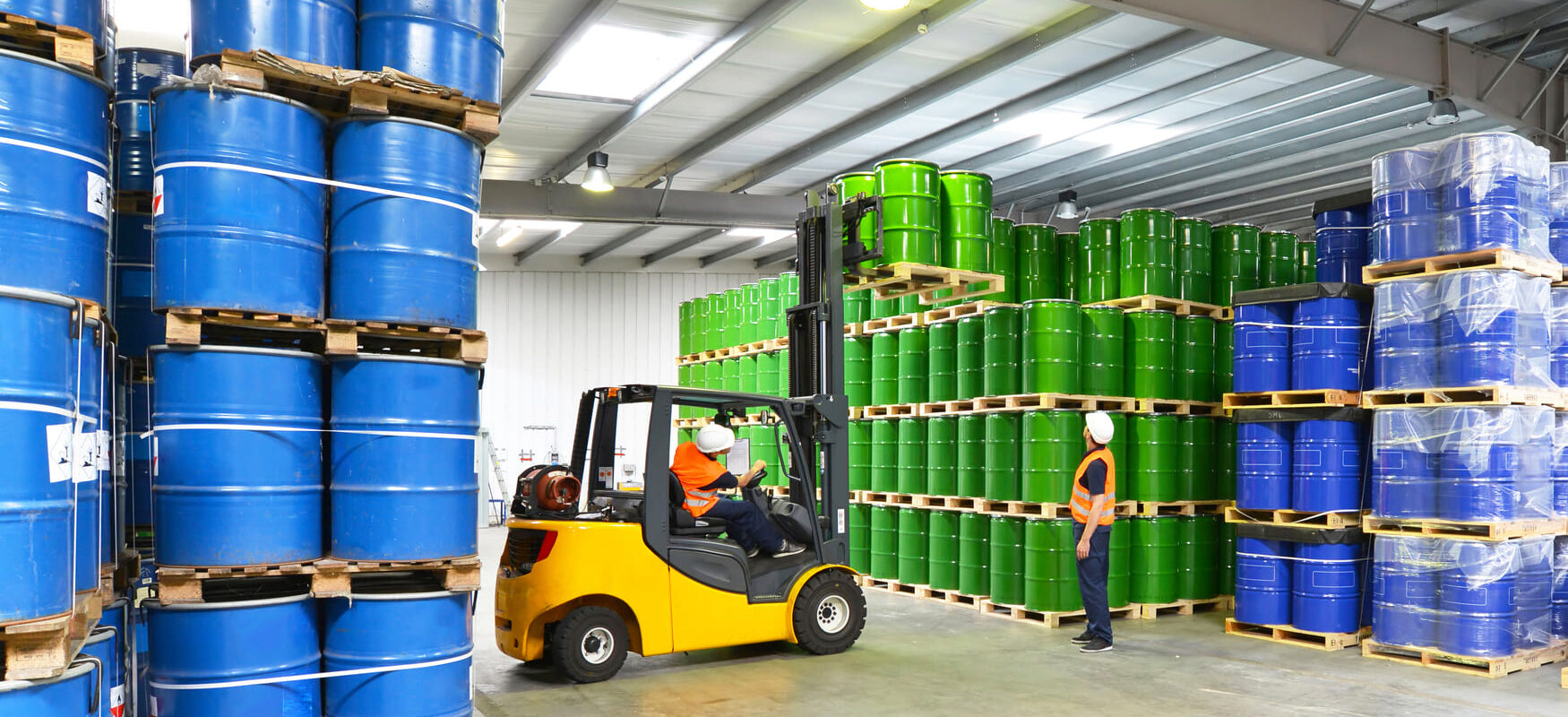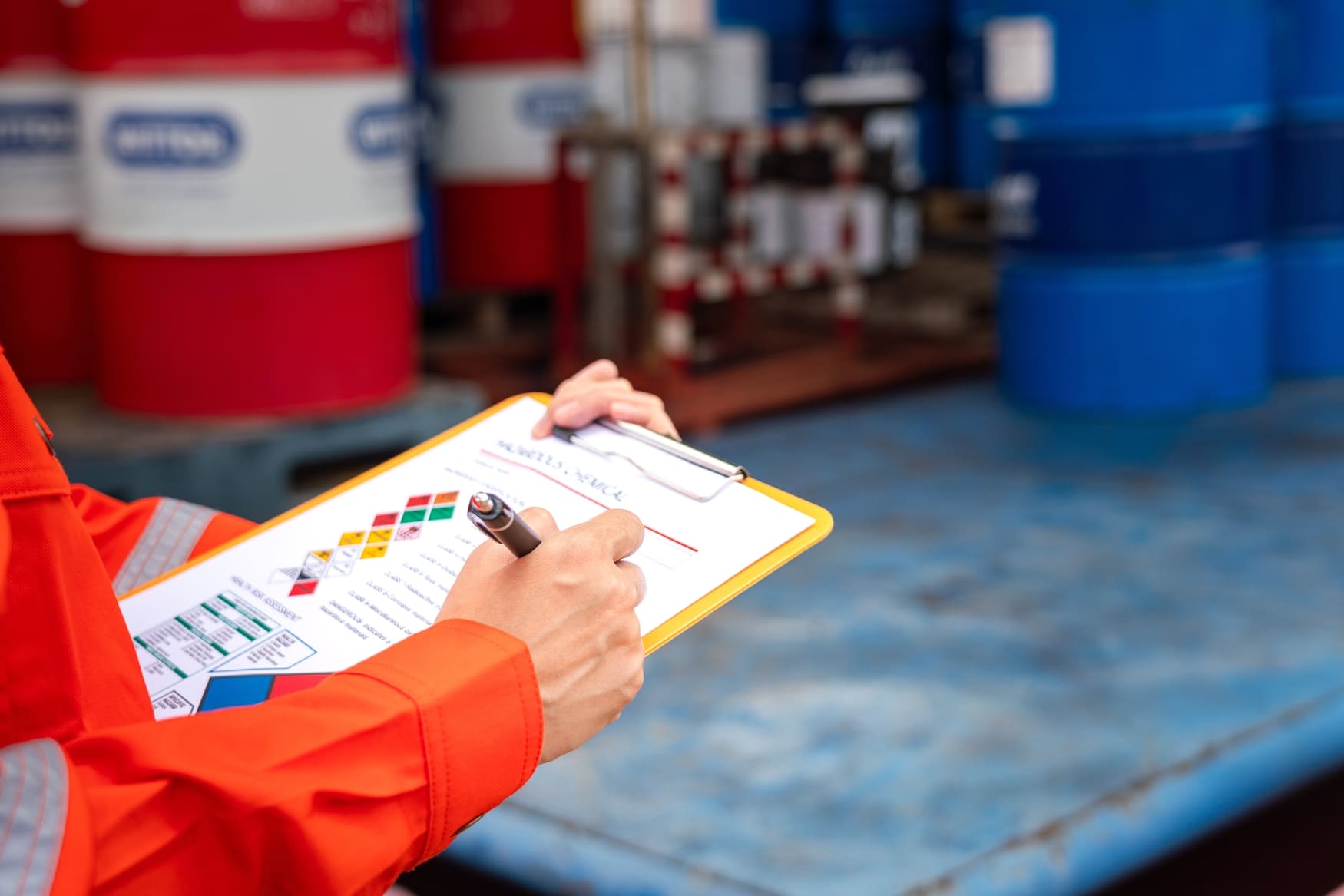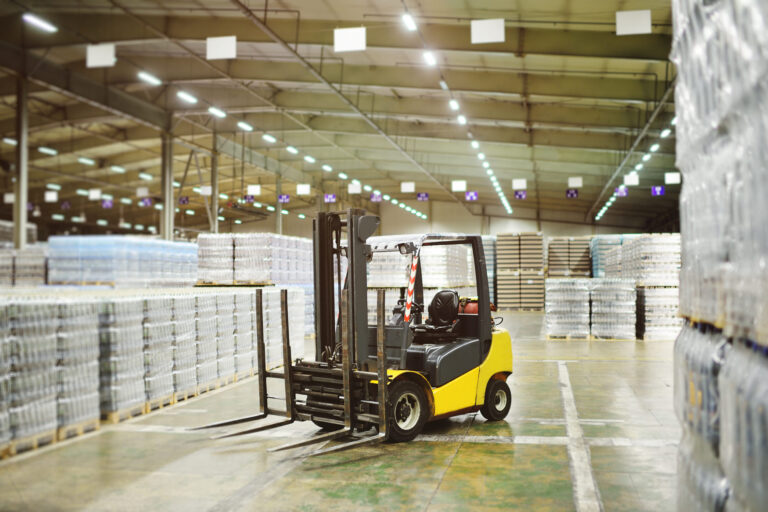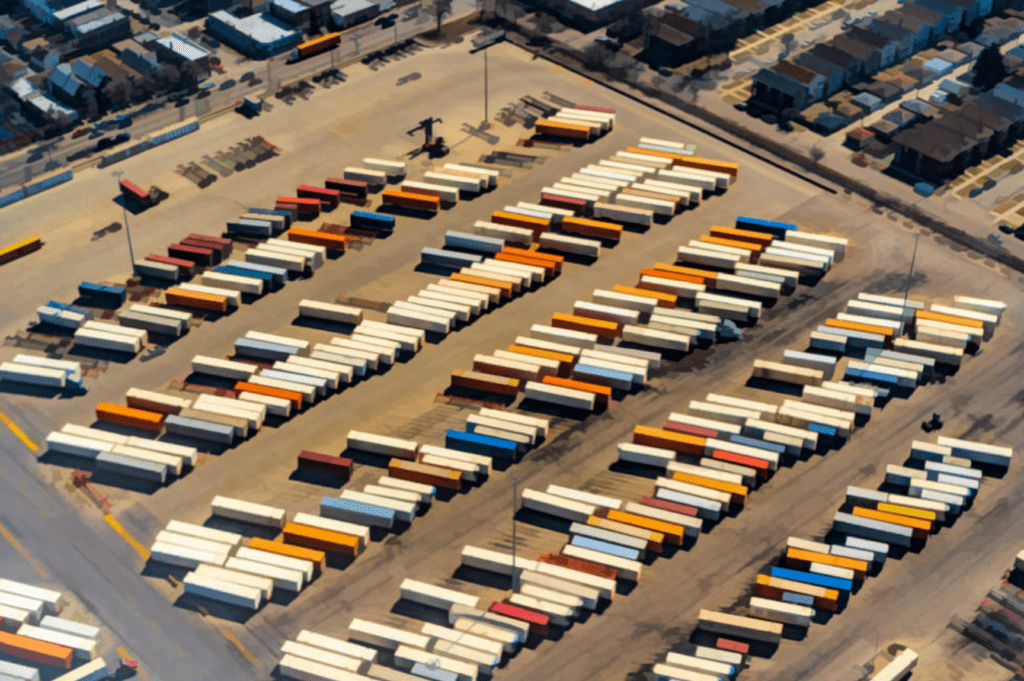Chemical Warehousing & HAZMAT Storage: Safety, Standards, and Best Practices

Chemical warehouse storing drums of hazardous substances under safety controls. Chemical warehousing (also called hazardous materials or HAZMAT warehousing) refers to specialized storage of chemicals and other dangerous goods under strict safety and regulatory controls. These facilities are designed to prevent accidents by segregating incompatible substances and complying with rigorous safety standards. In North America, companies must follow OSHA (U.S.) regulations and WHMIS (Canada) guidelines to manage chemical hazards. For example, OLIMP provides access to a nationwide network of fully certified HAZMAT warehouses across the U.S. and Canada, connecting shippers with facilities built for safe containment of flammable, corrosive, toxic, and other regulated materials. This approach ensures chemicals are handled, stored, and transported without posing risks to people or the environment.
Types of Chemical Warehouses
Chemical warehouses come in several types to suit different logistics needs. Common categories include:
- Dedicated chemical warehouses: Specialized facilities designed exclusively for certain chemicals or hazard classes. They feature advanced ventilation, spill containment and fire protection (e.g. sprinkler systems), and often allow only one chemical class at a time. This focused design “minimizes physical hazards” and ensures compliance with safety standards.
- Multipurpose warehouses: Versatile facilities that store multiple types of chemicals and other goods. They have adaptable systems (e.g. adjustable shelving, modular ventilation) and protocols to safely handle diverse products. Multipurpose sites suit businesses with varied chemical inventories, providing flexible storage while maintaining safety controls.
- 3PL (Third-Party Logistics) chemical facilities: Outsourced hazmat warehousing run by specialized logistics providers. These 3PLs handle the storage, repackaging, and distribution of hazardous materials on behalf of manufacturers or importers. They maintain certified systems and expertise to ensure full compliance. As inbound Logistics explains, 3PL chemical warehouses offer “advanced security measures” and even value-added services like hazardous packaging and transportation, providing an efficient, all-in-one solution.
- Cold-storage warehouses: Climate-controlled facilities for temperature-sensitive chemicals. These have high-quality insulation and precise refrigeration or humidity controls to keep products stable (e.g. certain solvents or agrochemicals). By maintaining low temperatures, cold warehouses prevent chemical degradation or unwanted reactions.
- Hazardous materials (hazmat) storage buildings: Highly specialized sites for the most dangerous chemicals (explosives, oxidizers, poisons). They feature state-of-the-art fire suppression (e.g. foam systems), secondary containment (bunds or sumps), and strict security. Such structures comply with codes like NFPA and OSHA for handling flammables, corrosives, and toxic gases.
Each type follows regulatory guidelines (OSHA, NFPA, DOT, etc.) tailored to the hazards involved. For example, dedicated warehouses may strictly segregate incompatible chemicals, while multipurpose or 3PL facilities rely on zoned layouts and mobile partitions to keep hazards apart. In all cases, choosing the right warehouse type depends on the volume, hazard classes, and handling requirements of the chemicals, as well as the need for integrated services like packaging and transportation.
Key Regulations for Chemical Storage Compliance
Chemical and hazmat warehousing is governed by rigorous standards and laws. In the U.S., key regulators include OSHA, EPA, DOT and even DHS (through CFATS). For example, OSHA’s Hazard Communication Standard (HCS) requires that all chemical hazards be clearly identified via labels and Safety Data Sheets (SDS), and that warehouse employees receive proper training on these hazards. The EPA’s hazardous waste rules further dictate how chemicals must be stored, contained, and disposed of, influencing warehouse design (e.g. spill berms, ventilation).
Among specialized requirements, facilities storing certain quantities of regulated chemicals fall under CFATS (Chemical Facility Anti-Terrorism Standards). CFATS, managed by DHS/CISA, covers any site holding one of the 300 “Chemicals of Interest.” If applicable, the warehouse must implement security measures (access controls, monitoring) and undergo periodic reviews. Additionally, DOT hazmat regulations classify chemicals into nine hazard classes (from explosives and gases to corrosives and toxic wastes), which dictate packaging, labeling, and storage conditions. International standards (IATA/IMO codes for air/sea transport) may also apply if the warehouse coordinates export/import.
Fire and building codes are equally important. For instance, OSHA cites NFPA 30 (Flammable and Combustible Liquids Code) for storage limits. As one industry source notes, OSHA limits flammable liquids to 60 gallons (or 120 gallons for combustible liquids) per storage cabinet or room. In practice, this means the warehouse must use fire-rated containers/cabinets and may need sprinkler protection for larger volumes. OSHA 29 CFR 1926.152 is another cited standard, covering flammable storage during construction/renovation. Many chemical warehouses therefore equip rooms with automatic sprinklers, explosion-proof lighting, and specialized ventilation to comply with NFPA/OSHA criteria.
In summary, chemical warehousing standards blend OSHA’s hazard communication, EPA waste rules, DOT hazmat codes, CFATS security measures, and NFPA fire codes. Compliance is enforced via regular audits by fire departments, environmental agencies, and transportation regulators. Warehouses often maintain certifications (e.g. C-TPAT for secure supply chains) and undergo annual inspections to stay audit-ready.

Types of Hazardous Materials
Before storing hazardous materials, it’s essential to understand the different types and classifications. Common categories include:
- Flammable Liquids: Such as gasoline, alcohol, and acetone.
- Corrosives: Including acids and bases like sulfuric acid and sodium hydroxide.
- Toxics: Substances that can cause harm if ingested or inhaled, like pesticides.
- Compressed Gases: Such as propane and oxygen tanks.
- Oxidizers: Materials that can cause or enhance combustion, such as hydrogen peroxide.
Each type of hazardous material requires specific storage conditions to mitigate risks effectively.
Hazmat Warehouse Design & Requirements
Safe HAZMAT storage relies on multiple design controls and protocols:
- Facility Construction: Use fire-resistant materials and reinforced structures. Walls, floors, and doors should resist chemical spills and fires. For example, hazmat buildings often have welded steel seams, sealed concrete floors with curbs (bund walls) of at least 12 inches height to contain spills. High-risk rooms (for corrosives or poisons) need dedicated ventilation that exhausts fumes safely outside the building. Doors and vents must be fire-rated, and emergency eyewashes or showers should be installed in corrosive areas.
- Quantity Limits: Adhere to mandated storage quantities per room or container. As noted above, OSHA/NFPA caps flammable liquids to 60 gallons in a single container (or 120 gallons for higher flash-point liquids). Total amounts of combustible liquids of Class IB, IC or IIIA must also not exceed 1,585 gallons in a single fire area. Similar limits exist for other classes (e.g. NFPA 400 sets maximums for oxidizers and organic peroxides). Warehouses must document these limits and often split large inventories into multiple fire-rated rooms or storage units.
- Segregation of Chemicals: Incompatible substances must be physically separated. For instance, oxidizers cannot be stored near organics or flammables, and acids away from bases. This usually means using separate rooms or barricades between classes. A practical rule-of-thumb is a 20-foot separation or non-combustible barriers between different hazard classes. Within the same class, certain chemicals may also need isolation (e.g. nitric acid vs organic acids). Warehouse operators often follow SDS (Safety Data Sheet) guidance and national chemical compatibility charts when planning the layout.
- Placement and Handling: Always store containers on stable shelves or racks, preferably at or below eye level. This reduces the risk of accidents when retrieving containers. Heavy drums and totes remain on lower racks; smaller bottles on upper shelves. All containers must be clearly labeled and kept closed when not in use. Loading/unloading areas should have spill kits on hand, and forklifts used in flammable areas must be spark-free types. Warehouse staff receive training on using personal protective equipment (PPE) like goggles and gloves when handling hazardous materials.
- Spill and Fire Protection: Secondary containment (spill basins or dikes) under bulk storage areas is essential to capture leaks. Automated fire suppression systems – such as sprinklers rated for chemical fires – are typically installed throughout. Many chemical warehouses also have gas leak detectors, alarm systems, and pre-planned evacuation routes. Emergency procedures (spill cleanup, fire response) are formalized in facility manuals. Some facilities even design “safe rooms” or shelters if toxic releases are a risk.
These requirements ensure that, in the event of a leak, spill or fire, the hazard is contained and managed without affecting adjoining areas or workers. For example, strict corrosive storage standards mandate ventilated rooms with sealed floors, which keep dangerous vapors out of common areas. Likewise, flammable storage areas often feature flame arrestors on vents and are kept cool and dry. Altogether, meeting hazmat warehouse requirements involves careful planning of every square foot of the facility.
Hazmat Warehousing Services and 3PL Considerations
Many companies outsource hazardous storage to specialized 3PL providers. A quality HAZMAT 3PL offers:
- Certified Facility: Official permits and audits. The warehouse should be licensed for hazmat storage (state/county EPA permits, hazmat certifications). Ask providers about EPA IDs and their safety audit history.
- Expert Staff: Trained chemists or safety officers manage the inventory. They understand SDS data, advise on segregation and limits, and oversee safety plans.
- Integrated Transportation: Coordination with hazmat carriers. The 3PL arranges for properly placarded trucks and drivers with HazMat endorsements, ensuring compliance from loading dock to destination.
- Value-added Services: Beyond storage, services may include repackaging, testing, blending, or just-in-time delivery. Leading 3PLs also assist with compliance (e.g. CFATS paperwork) and 24/7 emergency response.
Partnering with a seasoned hazmat 3PL brings expertise and risk mitigation. These providers maintain all compliance and safety protocols, letting shippers focus on production and distribution.
Best Practices for Chemical Storage
Top hazmat warehouses go beyond regulations. They implement proactive safety measures:
- Maintain an up-to-date inventory by hazard class (often electronic) to track locations and quantities.
- Clearly delineate zones for each class (using color-coded markings or labels) and rotate stock FIFO to avoid chemical degradation.
- Conduct regular emergency drills for spills, fires, or exposures. Keep Safety Data Sheets (SDS) accessible and train workers on spill kits, neutralizers, and extinguishers.
- Use technology: gas/vapor detectors, temperature and humidity sensors, and CCTV provide real-time alerts.
- Continuously train personnel on PPE use, hazard communication (labels, signage), and response protocols.
- Monitor environmental conditions (temperature, humidity, static ground) to meet both federal and stricter state exposure limits.
These best practices protect employees and assets and improve efficiency. In practice, companies report that strong safety culture and procedures can reduce accidents, downtime, and insurance costs.
✅ Request a Quote for Chemical & Hazmat Warehousing
Need compliant, reliable chemical or hazmat storage in North America? OLIMP connects you with certified warehouses ready to handle flammables, corrosives, toxics, gases, and other regulated materials.
Get pricing, availability, and facility details in minutes.
👉 Request your quote now: https://olimpwarehousing.com/rfq/
Frequently Asked Questions (FAQ) – OLIMP Warehousing
Q: What are the core requirements for storing chemicals safely?
Chemical storage requires following OSHA and NFPA standards, limiting quantities, using certified containers, and providing proper ventilation and fire protection. Chemicals must be clearly labeled, separated by hazard class, and handled by trained personnel to ensure safe operations.
Q: What regulations govern hazmat storage in North America?
In the U.S., OSHA, EPA, DOT, and NFPA standards regulate hazmat storage. In Canada, WHMIS rules apply. High-risk facilities may also need DHS CFATS security compliance. Together, these regulations define labeling, training, containment, and storage requirements.
Q: What types of materials are stored in hazmat warehouses?
Hazmat warehouses store flammable liquids, corrosives, toxic chemicals, compressed gases, oxidizers, and other regulated materials. Each category must be stored with specialized controls such as fire-rated cabinets, corrosion-resistant tubs, and proper segregation.
Q: Why use a 3PL for hazmat warehousing?
A hazmat-certified 3PL provides compliant storage, trained safety staff, and full regulatory management. They also coordinate hazmat transportation, offer repacking and emergency support, and reduce risk for shippers by handling all safety and compliance requirements.
You may be interested in

What Is Cold Storage Warehousing? A Guide to Refrigerated & Freezer Warehouses
A cold storage warehouse (also called a refrigerated warehouse or cold storage facility) is a highly insulated, climate-controlled building that preserves temperature-sensitive products by maintaining precise low-temperature zones. These warehouses use industrial refrigeration (compressors, condensers, evaporators, etc.) to remove heat and lock in cold air, much like a giant commercial refrigerator. For example, chilled storage […]

Food Warehousing and Food Grade Warehousing: Challenges and Solutions
Operating a warehouse that stores food requires specialized handling beyond standard warehousing. Food-grade facilities must meet strict sanitation, temperature control, and traceability standards to prevent contamination and spoilage. In fact, “food-grade warehousing is crucial for maintaining product quality, ensuring consumer safety, and complying with industry regulations.”. By upholding these standards, food warehouses become the critical […]

What Is On-Demand Warehousing? Flexible Storage Solutions for Modern Supply Chains
On-demand warehousing is a flexible logistics solution that allows businesses to rent warehouse space and services on a short-term or pay-as-you-go basis. Instead of locking into long-term contracts, companies can scale storage as needed—ideal for seasonal inventory, unexpected overflow, or launching into new markets. OLIMP connects businesses to a nationwide network of vetted, available warehouses, […]
Ready to streamline your warehousing needs?
Request a quote today and discover how OLIMP's tailored solutions can optimize your operations